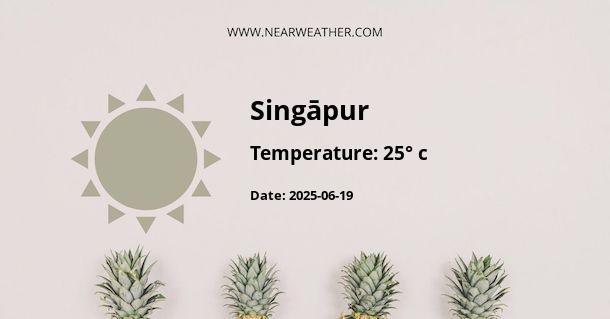The Climate and Weather in Singapore
Singapore, located in Southeast Asia, experiences a tropical rainforest climate. The city-state is known for its hot and humid weather throughout the year. The climate in Singapore is classified as equatorial, which means it is characterized by high temperatures, abundant rainfall, and little seasonal variation.
Temperature
The temperature in Singapore remains relatively constant throughout the year, with average highs ranging from 30°C (86°F) to 32°C (90°F) and average lows ranging from 23°C (73°F) to 25°C (77°F). The humidity levels are often high, making the weather feel even hotter. The city-state experiences very little temperature variation between day and night.
Due to its proximity to the equator, Singapore does not have distinct seasons like other countries. However, there are two monsoon seasons that affect the rainfall patterns in the region.
Rainfall
Singapore experiences high levels of rainfall throughout the year, with an average annual precipitation of around 2,400mm (94 inches). The two monsoon seasons, the Northeast Monsoon and the Southwest Monsoon, bring heavy showers to the region.
The Northeast Monsoon occurs from December to early March and is characterized by frequent short bursts of rain. This monsoon season brings the highest rainfall to Singapore, with an average of 240mm (9 inches) per month. The Southwest Monsoon, which occurs from June to September, brings less rainfall, with an average of 170mm (7 inches) per month.
Despite the high rainfall, Singapore also experiences a fair amount of sunshine throughout the year. The city-state receives an average of 6 to 8 hours of sunshine per day.
Climate Extremes
Singapore is generally not prone to extreme weather events such as typhoons or hurricanes due to its geographical location. However, the city-state can experience occasional heavy thunderstorms, especially during the monsoon seasons.
In recent years, Singapore has also faced challenges related to climate change. Rising sea levels and increased temperatures have led to concerns about flooding and heat stress. The government has implemented various measures to mitigate the effects of climate change and ensure the city-state remains resilient.
Best Time to Visit
While Singapore can be visited year-round, some months may be more favorable for certain activities. The period from February to April is generally considered the best time to visit as the weather is relatively dry and less humid. This makes it ideal for outdoor activities and exploring the city.
However, it is important to note that even during the wetter months, rain showers are usually short-lived and do not disrupt plans significantly. Visitors can still enjoy indoor attractions and shopping malls during these periods.
Summary
Singapore has a tropical rainforest climate characterized by hot and humid weather throughout the year. The temperature remains relatively constant, with little variation between day and night. The city-state experiences high levels of rainfall, particularly during the two monsoon seasons. Despite the rain, Singapore receives a fair amount of sunshine. While extreme weather events are rare, occasional heavy thunderstorms can occur. Overall, Singapore can be visited year-round, with the period from February to April considered the best time for outdoor activities.
A - Singāpur's Latitude is 17.469721 & Longitude is 78.127502.
A - Weather in Singāpur is 20° today.
A - Climate Conditions in Singāpur shows few clouds today.
A - Humidity in Singāpur is 46% today.
A - Wind speed in Singāpur is 5.22 km/h, flowing at 154° wind direction. today.
